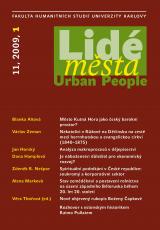Je náboženství důležité pro ekonomický rozvoj?
DOI:
https://doi.org/10.14712/12128112.3674Klíčová slova:
religion, religiousness, economic values, economic developmentAbstrakt
This article deals with the issue of the connection of religion and economics. The first part summarises the basic elements of sociological debates on this theme with an emphasis on Max Weber. First, we briefly mention Weber’s theory on the meaning of Protestantism for the rise of capitalism and then we summarise the critical reactions to this hypothesis. The author shows that criticism of Weber’s works focuses on both the question of causality and historical inaccuracies, and on the question of the mechanisms that could play a role in connection with Protestantism on the one hand and with capitalism and industrialism on the other. Furthermore, the text presents post-Weber research on the issue of religion and economic attitudes and conduct. The final part of the article analyses data from two Czech empiric studies and shows that religion (measured by confession and attendance of divine services) influences economic attitudes even in the Czech Republic.
Stahování
Publikováno
Jak citovat
Číslo
Sekce
Licence

Tato práce je licencována pod Mezinárodní licencí Creative Commons Attribution-NonCommercial-NoDerivatives 4.0.


